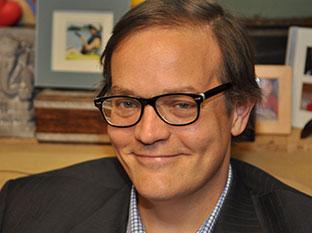
Cleveland-Marshall College of Law’s James A. Thomas Distinguished Professor Chris Sagers believes there are two reasons why individuals enter the antitrust field. People either move to antitrust from the business world, viewing it as an extension of their other business expertise, or they assess antitrust as a social issue in how the government addresses the idea of private power. Sagers is in the later camp, with his interest in antitrust law formulating around the sociological aspects of governmental rule.
The C|M|LAW professor has become one of the leading experts in the country on antitrust law, frequently appearing in national media including the New York Times, L.A. Times and Wall Street Journal, and as a guest on National Public Radio and CNBC.
Sagers is currently working on his forthcoming book to be published in 2017 by Harvard University Press, "Apple, Antitrust, and Irony." The book examines United States v. Apple, a Justice Department antitrust challenge accusing Apple and several book publishers of fixing the retail prices of eBooks. The case study reveals an important phenomenon: that the case was “an absolute slam-dunk” from the perspective of legal doctrine, but one where the wider public found the decision troubling and problematic despite theoretical support for competition. The book sets out to examine why, and to ask whether competition policy can be preserved in a form that would have positive economic effects and retain popular support.
Looking at the current state of antitrust regulation, Sagers feels there is “a lot of uncertainty right now just like there is uncertainty everywhere after the 2016 election.” According to Sagers, antitrust enforcement by all political parties has taken a much more cautious approach to interfering with business activities since the 1970s and that is not likely to change under a Trump administration that may ultimately look similar in terms of regulation to the second Bush administration. The professor sees the principal reason antitrust regulation might be in trouble as intervention by Congress, a body which usually does not hold great power in anti-trust enforcement. Sagers believes there are indications that the next Congress may attempt to impose significant restrictions to class-action certification requirements and without the class-action lawsuits that make up approximately 90% of all anti-trust enforcement, there would be a lack of individual incentive necessary to pursue anti-trust violators.
“The reason anti-trust enforcement usually has to be initiated by class actions is that individually antitrust injuries are typically very small,” explained Sagers. “For instance if companies collude to fix prices, the overall harm to the economy might be in the hundreds of millions but the harm to average consumer affected by the price overcharge might only be injured by 10 or 20 dollars.”
The area of business where Sagers’ exhibits his most pragmatic viewpoint is in his work as Faculty Director of the C|M|LAW Solo Practice Incubator. The professor loves the idea of helping people start business and believes law schools have long ignored educating students on how to run law businesses.
Sagers started as faculty director of incubator when it opened in 2014 and has been a professor at Cleveland-Marshall since 2002. He enjoys most the daily intellectual aspect of academics but he loves teaching students even more than he expected when entering the profession. In 2015, he was awarded the Cleveland State University's Distinguished Research Award for Faculty and in 2016, he received the CSU Alumni Association’s Golden Apple Award, given to faculty and staff based on their outstanding contributions to the lives of students.
Antitrust, business and law were far from Sagers’ mind when he attended the University of Iowa as an undergraduate studying music composition. His mother was a music teacher and Sagers grew up singing and playing the piano, trumpet and guitar. After realizing he did not have the skills to earn a living as a performer, Sagers briefly considered become a music professor before transitioning to another family profession of lawyer and enrolling at the University of Michigan School of Law. He found legal studies required much more creativity than he had imagined and the balance with intellectual thought suited him well.
Sagers also picked up his most unique hobby from a family member, following in the footsteps of his older brother who makes handmade furniture for a living by taking up woodworking. His home and office are filled with increasingly sophisticated furniture items Sagers has crafted by hand, sometimes taking several years to finish a single piece.
“Woodworking is a relief from the daily intellect, as any hobby would be, but it has its own intricacies,” explained Sagers. “What is most satisfying about woodworking is the finished project but the actual making of the piece can be very frustrating. I don’t think of it as an escape from intellectual work as much as it is a different kind of spiritual experience getting into the wood and revealing its inner beauty.”
